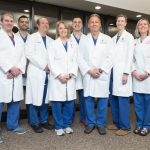Each year the Division of Transplant Anesthesia assists more than 100 liver transplants and hundreds of other abdominal organ transplants, including kidney and pancreas transplantation.
We provide the anesthetic and perioperative care for abdominal organ transplant recipients and organ donors and exclusively anesthetic care for liver transplant recipients and donors. Our core group of board-certified anesthesiologists possesses the diverse and multi-disciplinary training and experience needed to understand the complex physiology of end-stage organ failure, liver disease, and the intricacies of the liver transplant and abdominal transplant surgery. In addition to fellowship training in transplant anesthesiology, many members of the division are also formally trained and board-certified in additional anesthesia subspecialties and other medical specialties such as cardiovascular anesthesia, critical care anesthesia, internal medicine, and transfusion medicine.

Our tradition of close collaboration with the transplant surgeons and other members of the transplant department has become the model for liver transplant centers for the American Society of Anesthesiologists and the United Network of Organ Sharing. Working closely with the Department of Surgery, division co-leaders take an active role in the selection and preoperative evaluation of transplant recipients, particularly liver recipients. We frequently collaborate with transplant surgeons and other specialists — such as cardiology, pulmonary or other disciplines — to plan multidisciplinary care and create guidelines for the pre- and post-operative care of particularly complex patients.
We ensure all anesthesia residents are instructed not only on the intraoperative anesthetic management but also receive education on end-stage organ failure and physiology, the process of organ resource allocation, and the evaluation of potential transplant candidates.
Division Highlight
Dr. Molly Groose studies the effects of vitamin C on biochemical and cellular damage in liver transplant recipients in order to optimize graft outcomes. Her randomized, double-blind, placebo-controlled clinical trial titled “Parenteral Ascorbic Acid Repletion in Transplantation (PARTI)” aims to determine the clinical response to parenteral vitamin C supplementation in patients undergoing liver transplantation. Because recipient need is so much greater than donor availability, improving recipient outcomes and maximizing graft survival is critically important.
